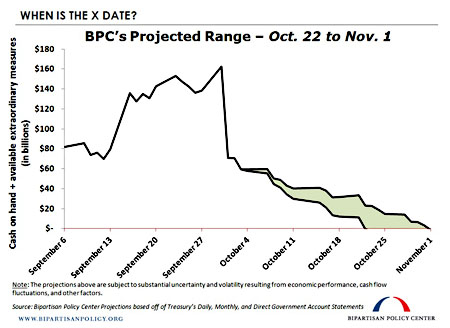Just a quick note about the debt ceiling battle that I think is getting a bit lost: although the Treasury Department hasn’t officially modified its October 17 estimate of doomsday, it seems almost certain that it’s no longer the most likely date that we run out of money to pay our bills. The government shutdown hasn’t stopped a ton of spending, but it has stopped some spending, and the Bipartisan Policy Center’s most recent analysis of cash flow suggests that money will run dry sometime between October 22 and November 1.
So if October 17 comes and goes and Armageddon hasn’t arrived, don’t be too surprised and don’t listen to conservatives who claim that this means the whole thing has just been a big scam all along. We’re still on track for doomsday, but most likely it will arrive next week, not this week.


















